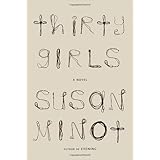
Bob Shacochis
Author
Bob Shacochis is an acclaimed American novelist, short story writer, and literary journalist. He teaches creative writing at Florida State University. wikipedia.org
- September 9, 1951 (age 62)
The plot of the novel is complex and undulating. It begins in the late '90's in a strife-torn Haiti, between the first and second coups that removed, then reinstated, and then removed once more, the democratically elected president, Jean Bertrand Aristide. The part played by the CIA in Haiti's upheaval, though well-documented, doesn't actually seem to have been admitted to. This novel will disabuse you of any thought to that organization's innocence.
Tom Harrington, a human rights lawyer living in Miami, heads to Haiti where he often works, to locate and return the body of an American woman, who was murdered in an highway ambush. Not until Tom sees the photo of her does he realize that he knew this woman. Several years earlier their paths had crossed, but at the time, she went by a different name.
Readers are then transported to an earlier Haiti, when Jackie Scott, posing as a free-lance photographer, used Tom Harrington to help her find her soul. But their connection is only a third of the story. To fill in the missing pieces Shacochis takes us as far back as World War II Dubrovnik where a little boy witnesses the beheading of his father and the rape of his mother, war crimes whose effect will percolate within that youngster until a monster, wearing a mantle of righteousness, is born.
In the 1980's, in Istanbul, Turkey, Jackie, then known as Dottie, is an anomaly, a striking blond teenager in a sea of Turkish men. The nuns at her parochial school can't keep the feisty, privileged Dottie down, and soon she is infatuated with Osman, a devout young Muslim. But Dottie has watchers, men who work for her father, reporting on her every move and paid to be sure that Dottie doesn't stray too far from her overbearing daddy.
Informed by his background as a Peace Corps volunteer, and later by 18 months embedded with special forces in Haiti, Bob Shacochis brings an insider's knowledge to this piece of fiction that rings of a sad truth. Who can anybody trust? Is anyone who he seems? Back door deals are undermined by subtler back door deals. If someone is caught in deception? Plausible deniablity.
This is a fascinating book, beautifully written, even if it is about an ugly subject. It's no surprise to see that it was in contention for the Pulitzer Prize. Even though I've stated unequivocally that "The Goldfinch," is the benchmark for me this year, "The Woman Who Lost Her Soul" is certainly a strong contender.

